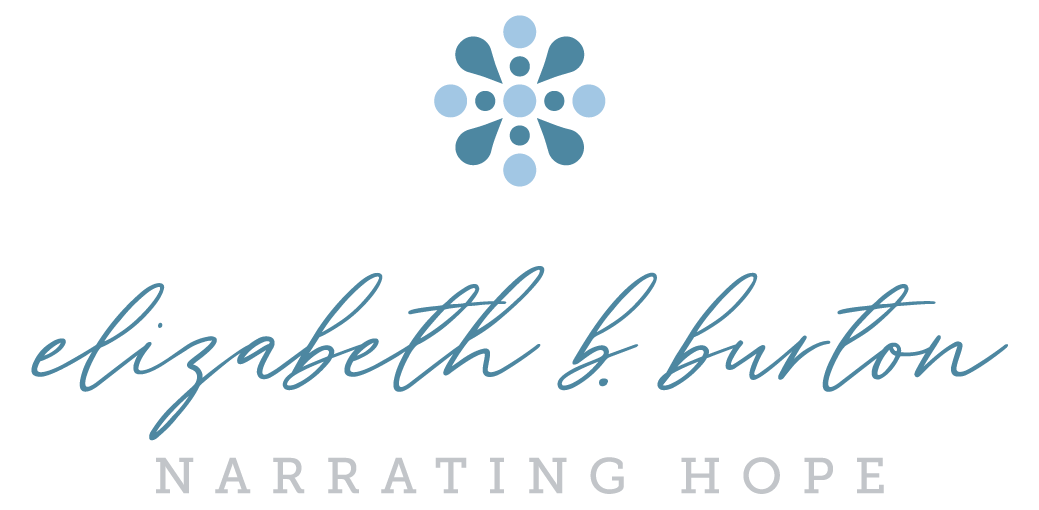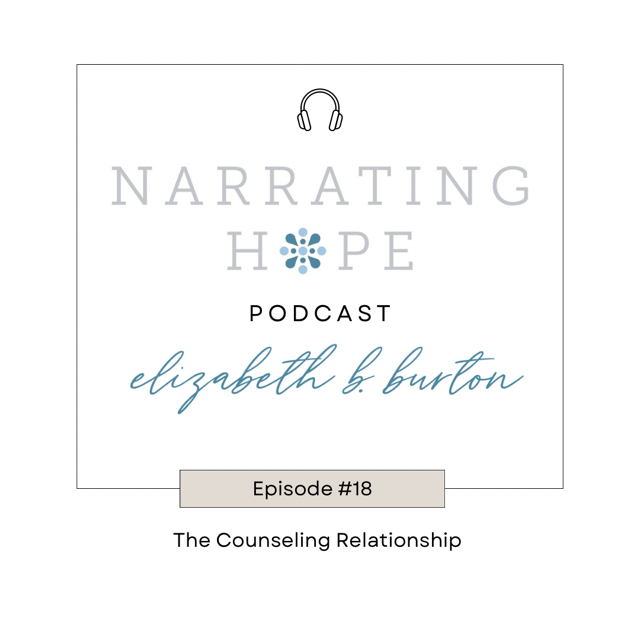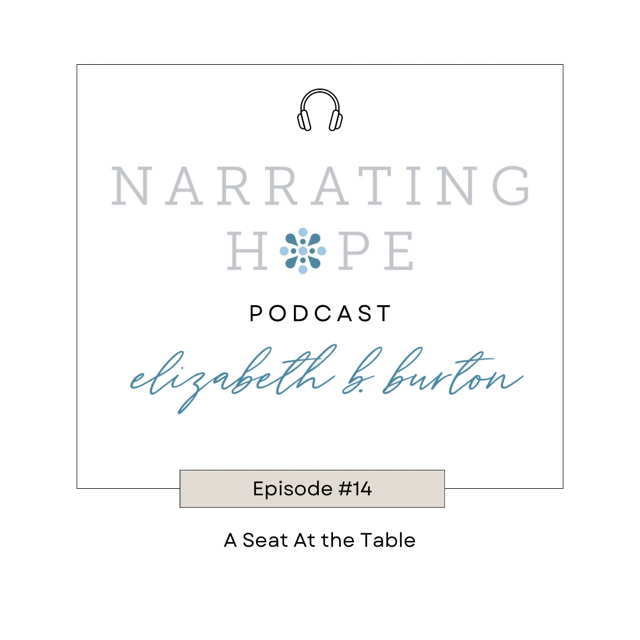follow along on spotify & APPLe
What Are the Patterns? Getting Honest about RElationship patterns may position you for healthy change
Just because something's been a pattern doesn't mean it has to continue. There is hope to break patterns—to create new dynamics…It's not the conflict itself that's the problem. It's really examining the patterns. Do we have healthy dynamics around communication? Do we have a posture of voicing in an assertive way what we're feeling and what we need and also listening to the person we're in relationship with, what's going on with them, what do they need? What do you need together for it to be a healthier dynamic?
Let’s Talk About Body Image
It is very natural as people to be critical, to focus on the negative in a way where we take everything else really out of context and we build up and blow up the negative thought as truth, as everything, as the end of the story and it's just not. And when we can start to recognize that it's just a critical thought, just a critical thought about my body or a part of my body, but it doesn't tell the whole story. And then we can ground ourselves in really asking the question, what do I like about my body? My thoughts are naturally going to go to what I don't like and what I don't feel confident about. But how can I widen the context towards also looking at what I do like and naming that and grounding myself in the truth that none of us as real people are meant to have this media image, body or appearance all the time.
Challenging Avoidance Strategies: Changing the Power of Anxiety in Your LIfe
And it's a very natural phenomenon and very normal for someone to conclude if I just avoid what makes me anxious, then I will be safe, then I will be okay, then I will be less triggered. And while those things might be true in the short run, often over time, it's not a sustainable long term coping strategy. Because many times what we are avoiding are actually the things that help us grow and help us develop competence and help us develop a sense that we can navigate and be okay in and through hard things, that we can be triggered and be okay.
What are your Limits? Naming limits quiets the inner critic and Supports more sustainability
Some of us are more likely to admit that we have limits and are fairly in tune with naming those limits, and others of us are not and continue to hold up perhaps an unrealistic standard of what we feel like we should be or should be accomplishing or our capacity in a way that doesn't match our reality. And that can be a continual source of frustration, it can be a source of disappointment, and it can also really move into being more of a source of shame if the inner critic is so harsh.
All or Nothing Thinking? Challenging the Narrative.
So that when you have a narrative that's really causing problems because it's so rigid or fixed, it's so all or nothing that you can challenge it. I see this all the time with things like related to exercise or eating to soften that narrative of just because someone didn't exercise on one day doesn't mean they have to throw in the towel or that they're lazy.Actually it could have been what they needed, that they were sick or exhausted or had other priorities. And so we can make space for a softer narrative and that they can the next day, go for a walk again and keep living in the way that they value…
Take Some Time
And I recognize that in the world that we live in, we are often rushing and going and hurrying from one thing to the next. Even how we might approach just each day through a to do list and checking things off, there can be this sense of “my whole day is based on my productivity.” And of course it feels great to check things off, but what happens sometimes is that we get in kind of an autopilot dynamic... And it takes some intentional reflection, which really comes from slowing down enough to even make space to consider how you're doing, the state of your heart, how you're feeling, what you're thinking, what you need…
Sustainable Caregiving
And yet it's so important to consider that concept of sustainability, because while caregiving may be a short term experience, it often is for a longer road. And in order to show up daily, or just about daily for another person, we need to be tuned in to the concept of considering also what we need in order to keep pouring out. I think all of you have probably heard that quote about how you can't pour from an empty cup. And it's one of those that no matter how many times you hear, it can be really good to keep being reminded and to consider for yourself...Am I filled up? What helps me keep pouring out? ...Of all the things, all the various coping strategies and choices and habits and things I can do with my time, which of those things are so life-giving to me that they help me pour out and care for the people that I need to care for?
Consider the Season
Am I in a season of growth? Am I in a season of adjustment? Am I in a season of grief? Am I in a season of discipline, perhaps, or just transition…? Am I in a season of loneliness where I really long for more connections? Am I in a season of abundance, where things are going really well and there's just a lot to enjoy, but it's a fast pace? So in this, I just want to encourage you to, similarly to the literal seasons, to name the season you're in in a larger sense. What is this time like for you? And when you can name what it's like, you're validating your internal world and your experience…
Assertive Communication
…In that realm, there is a dynamic of feeling like you have some agency over your own life. Whether that's in the workplace, whether that's in a marriage or dating type relationship, whether that's in a friendship, whether that's in your family of being a sibling or a daughter or a son or a parent, or all of the above, that you get to speak into your life. Meaning when something is not okay with you, you can say that. And ideally you have people in your life who will hear your voice and respect it too…
Externalizing Anxiety’s Voice
…If the message that is looping in your head is a message of anxiety telling you to avoid something that's actually healthy for you, good for you, that's something that you want in your life, but you're avoiding it because that anxiety message is so strong, then consider really writing it down, typing it out, externalizing it, and connecting it with anxiety's voice and see if that creates some distance for you. Sometimes just that shift alone is so significant that it can help you really begin to work towards that claiming of a more true narrative.
Claiming Margin
…But it's just where do I have room to speak into the dynamic? Where can I create some breathing room so that I can say yes to my commitments and responsibilities in a more sustainable way, so that I have recovered between stressors, so that I have rested and been refueled?…Do I have white space or do I feel so rushed, hurried, programmed and scheduled that there's not even time to sit down or to think, or to reflect or to play or to rest? And is that how you want to live?…
Am I Overfunctioning?
…Yet sometimes with stress and anxiety and often perfectionism or a lot of pressure to get it right and to have this perfect image, we can move towards a realm of overfunctioning. And what that means is that it's not really about working hard or showing up or valuing excellence or great work ethic or anything like that. It's more about moving into a realm of having to be all things at all times or perfect at all times or to rescue, instead of really recognizing that we all have limits and that it's okay to do the best you can…
The Counseling Relationship
I hope that it's encouraging for anyone listening who has tried counseling before and it wasn't a great experience. It may be that the relationship wasn't what it needed to be. And does that mean you have to write off counseling altogether? Or is it possible that there could be a better connection with a different counselor?
Scarcity Mindset, Longings, & Gratitude
And so my hope would be today that if you are someone who can very much relate to, yes, I have that scarcity mindset, then take notice. Where does it show up in your life? Is it about your body? Is it about your finances? Is it about your home, your profession, your parenting, your personality? And by noticing it and being cognizant that you naturally maybe go to that thought narrative, then you're in a position to intentionally consider what is it about these pictures or this other person's story that I'm hearing that's maybe a longing for me, and I can name that and I can notice it.
Boundaries and Core Beliefs
And once you can identify a core belief or two that might be driving a lot of your choices and your behavior, then when you're ready, you can begin to challenge those beliefs and work towards a reframe. So, for example, if my belief is that I need to please people at all times, I can work towards a more realistic understanding of relationships-- that it's not my job to please people at all times, but I can still value peacemaking and pleasing as something I generally bring to the table.
Letting Go of Perfectionism
And what I really love is to elevate authenticity instead of perfectionism. Because you are a human being, and as a human being, how can you be real? And often being authentic is vulnerable, so sometimes we kind of shy away from that. And perfectionism feels kind of like a shield, like something we can hide behind…
A Seat At the Table
Not only is that not true, but maybe there's an alternative narrative. Something like, “I'm a person of worth and value, and there's a seat at the table for me, and I'm allowed to take up some space. I'm allowed to have a voice and to show up as I am.” Not based on my accomplishments or my accolades or my productivity or my appearance or the size of my body or the state of my bank account, my relationship status, my ability to play sports or to cook a good meal or to have a beautifully decorated home or really, really nice clothes. None of that is related to that inherent worthiness. It is a given. It is a non negotiable in a world that maybe doesn't tell us that. And so we have to work to cultivate that for ourselves.
Feeling Overwhelmed Before Christmas
Many times the asks for our time are greater than maybe what we really have to give. And in that we're acknowledging some degree of having limits. As human beings, we are all capable of giving so much and doing so much. But sometimes we do need to rest, sometimes we do need to regroup. And so if part of the state of overwhelm is coming from a state of frenzy… “I don't have time because I'm never home,” then please consider looking at your calendar.
Gratitude and Narrative
And a lot of our life is like this. We look for the negative. We look for what's not going well, what hurts us, what pains us. And while it is important to name those things and to make space for those things, we don't want to fixate our gaze, in a sense, in our minds, only on those things without grounding ourselves in the wider narrative so that we also take in what we're thankful for, what we're grateful for, noticing often through the lens of small things, the things that sustain us, the things that bring delight, the places in our life where we can say, “I have enough and it is good, and thank you, and I'm grateful.”
Holidays: Grief & Meaning Making
Just as that is one dimension, we also have this other dimension of meaning making, even in the hardest of times of beginning to ask the question—okay, given this reality, what brings joy or hope or any kind of meaning to this holiday season? What makes it feel more bearable? What sparks some light, kind of like opening a door or lifting a shade to a window? What brings light into this holiday season for me or what might bring it into this holiday season for my family?





















